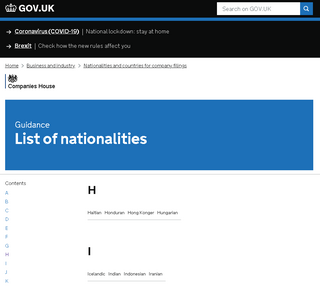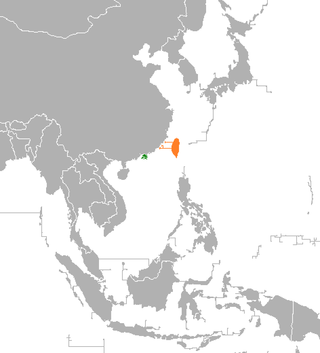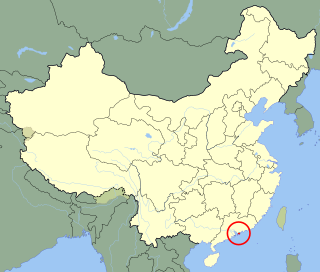
Demographic features of the population of Hong Kong include population density, ethnicity, education level, the health of the populace, religious affiliations, and other aspects.
The culture of Hong Kong is primarily a mix of Chinese and Western influences, stemming from Lingnan Cantonese roots and later fusing with British culture due to British colonialism. As an international financial center dubbed "Asia's World City", contemporary Hong Kong has also absorbed many international influences from around the world. Moreover, Hong Kong also has indigenous people and ethnic minorities from South and Southeast Asia, whose cultures all play integral parts in modern-day Hong Kong culture. As a result, after the 1997 transfer of sovereignty to the People's Republic of China, Hong Kong has continued to develop a unique identity under the rubric of One Country, Two Systems.
Shina is a largely archaic name for China. The word was originally used in Japanese and had a neutral connotation, but came to be perceived as derogatory by Chinese people during the course of the First and Second Sino-Japanese Wars. As a result, it fell into disuse following World War II and is now viewed as offensive, with the standard Japanese name for China being replaced by 中国.

British National (Overseas), abbreviated BN(O), is a class of British nationality associated with the former colony of Hong Kong. The status was acquired through voluntary registration by individuals with a connection to the territory who had been British Dependent Territories citizens (BDTCs) before the handover to China in 1997. Registration for BN(O) status was limited to the 10-year period preceding the transfer as a transitional arrangement for former BDTCs; current residents cannot newly acquire this nationality.

The 1990s in Hong Kong marked a transitional period and the last decade of colonial rule in Hong Kong.

British nationality law as it pertains to Hong Kong has been unusual ever since Hong Kong became a British colony in 1842. From its beginning as a sparsely populated trading port to today's cosmopolitan international financial centre and world city of over seven million people, the territory has attracted refugees, immigrants and expatriates alike searching for a new life.
Britons never made up more than a small portion of the population in Hong Kong, despite Hong Kong having been under British rule for more than 150 years. However, they did leave their mark on Hong Kong's institutions, culture and architecture. The British population in Hong Kong today consists mainly of career expatriates working in banking, education, real estate, law and consultancy, as well as many British-born ethnic Chinese, former Chinese émigrés to the UK and Hong Kongers who successfully applied for full British citizenship before the transfer of sovereignty in 1997.
A Hong Kong returnee is a resident of Hong Kong who emigrated to another country, lived for an extended period of time in his or her adopted home, and then subsequently moved back to Hong Kong.

Chinese nationality law details the conditions by which a person holds nationality of the People's Republic of China (PRC). The primary law governing these requirements is the Nationality Law of the People's Republic of China, which came into force on September 10, 1980.
New immigrants in Hong Kong generally refers to migrants from mainland China (Mainlanders). Despite its literal meaning, the term is rarely used to describe newly arrived immigrants from regions other than Mainland China. Since the transfer of sovereignty over Hong Kong to The People's Republic of China, increasing numbers of migrants from mainland China have been coming to the territory.
Hong Kongers in the United Kingdom are people from Hong Kong who are residing in the United Kingdom or British nationals of Hong Kong origin or descent.
Hongkongers, Hong Kongers, Hong Kongese, Hongkongese, Hong Kong citizens and Hong Kong people are demonyms that refer to the resident of Hong Kong, although they may also refer to others who were born and/or raised in the territory.
Hong Kong Canadians are Canadians who were born or raised in Hong Kong, hold permanent residency in Hong Kong, or trace their ancestry back to Hong Kong. In Canada, the majority of Hong Kong Canadians reside in the metropolitan areas of Toronto and Vancouver. Many Hong Kong Canadians continue to maintain their status as Hong Kong permanent residents.
In January 2012, Peking University professor Kong Qingdong made televised remarks suggesting that many Hongkongers were disloyal to China and still harboured a colonial mentality. Kong Qingdong called Hongkongers "dogs" in response to an online video posted about a mainland Chinese child eating on the subway, which is prohibited by MTR regulations. This prompted a series of campaigns against Kong Qingdong in Hong Kong. About 150 people gathered at the Central Government's Liaison Office on 22 January to protest Kong's remarks.
Chinese Canadians are a sizable part of the population in Greater Vancouver, especially in the Chinese communities in the city of Vancouver and the adjoining suburban city of Richmond. The legacy of Chinese immigration is prevalent throughout the Vancouver area.

Relations between the government of Hong Kong and the Republic of China (Taiwan) encompass both when the Republic of China controlled mainland China, and afterwards, when the Republic of China fled to Taiwan.

Hong Kong–mainland China relations refer to the relationship between Mainland China and Hong Kong. According to the 1997 Sino-British Joint Declaration, the United Kingdom handed control of Hong Kong over to the People's Republic of China, making it a special administrative region. In principle, Hong Kong became an autonomous administrative division based on the Hong Kong Basic Law.

The Hong Kong national security law, officially the Law of the People's Republic of China on Safeguarding National Security in the Hong Kong Special Administrative Region is a national law of China on Hong Kong national security passed in 2020. It is implemented in Hong Kong in accordance to Hong Kong Basic Law Article 18, which allows for Chinese laws to be valid in Hong Kong if they are included in Annex III. It was formulated under the authorization of the National People's Congress decision on Hong Kong national security legislation. The law was passed on 30 June 2020 by the Standing Committee of the National People's Congress as a means of resolving the anti-extradition bill protests instigated by a Hong Kong local bill proposed in 2019 to enable extradition to other territories including the mainland, and came into force the same day.

Hong Kong 12, or 12 Hongkongers, are the twelve Hong Kong protesters, previously arrested by the Hong Kong police, detained by the Chinese authorities in 2020 on sea after a failed attempt to flee to Taiwan.
Locust is an ethnic slur against the Mainland Chinese people in Hong Kong. The derogatory remark is frequently used in protest, social media, and localist publications in Hong Kong, especially when the topics involves the influx of mainland Chinese tourists, immigrants, parallel traders, and the pro-democracy movement.








